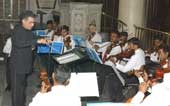|
|
No ensemble can succeed without a good leader, an experienced and committed conductor and, most of all, financial support. One must bear in mind the necessity of skilful musicians who are willing to subdue ego and submit to the guidance of their conductor. This combined spirit is the discipline that has marked the progress and success of the Calcutta Chamber Orchestra, a string ensemble of 24 musicians who work and perform regularly under their energetic young conductor, Sanjib Mondal. Since this group came under the support of the Calcutta School of Music last year, Phiroze Mistry has regularly come down from Pune as a visiting conductor to train and conduct them for concerts in the city. With each presentation, the development of style, timbre and programme has been improving noticeably, and on February 24, within the excellent acoustics of St John’s Church and to a small but appreciative audience, they gave a short and pleasing performance of popular and well-chosen pieces.
Phiroze Mistry’s experience and command were evident in the well-disciplined bowing, posture and attentiveness, the well-concerted dynamics and general deportment of the musicians. There may still be detected little flaws of intonation, which detract from that indefinable quality that adds to the finesse of professional chamber groups, but they will soon be there.
They began with the Arrival of the Queen of Sheba by Handel. The commencement was precise, and proceeded at a rather careful pace to its rhythmic end. Vivaldi’s Concerto in A Minor for two violins featured Phiroze Mistry and Sanjib Mondal as soloists. A disciplined performance with a vigorous entry, so typically Vivaldi; the playing was balanced and neatly executed with elegant diminuendo finales.
The much more dynamic and harmonically interesting Corelli Concerto Grosso in G Minor, Opus 6, No. 8, with its rich cello ostinato — sadly, not always perfectly intoned — displayed the fine orchestral timbre that this chamber group is beginning to acquire. After a short break, Schubert’s Marche Militaire was valiantly played, despite missing brass and woodwinds, and Marquina’s España Cañi was given an exciting rendition, followed by the waltzes from Die Fledermaus by Johann Strauss the younger.
The applause at the conclusion, so far contained (by request) owing to the sacred nature of the venue, demanded an encore, and the waltzes were repeated — this time, however, played with an exciting abandon, which was missed at their first playing. We look forward to the musical progress of this promising chamber ensemble.












